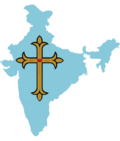History
Many Indian Christians believe that the Apostle Thomas brought the Christian message to India in 52AD. In the words of an Indian hymn, "...It was his mission to espouse India to the One-Begotten...." [2] Some Indian Brethren disclaim their missionary origins, instead making a case for historical continuity with the First-Century converts of the Apostle Thomas, [3] claiming that for several centuries Christians on the Malabar coast (modern Kerala) followed what Brethren believe to have been the New Testament model of church organisation and worship, with no clergy, and that clericalism began to creep in only after 345 AD, when seventy-two families belonging to seven Jewish clans followed Thomas of Cana from Iraq to Kodungalloor, which is now in Kerala. Thomas of Cana, they claim, brought in bishops and deacons, changing the practices of the Kerala Christians. This interpretation of history is not widely shared by non-Brethren Christians, however.
The modern Brethren movement was introduced into India in 1833 by Anthony Norris Groves, [4] [5] a dentist turned missionary who was one of the original Plymouth Brethren pioneers in Ireland. The Brethren movement began to take root in Kerala when Mathai Upadeshi, who had been an (Anglican) CMS evangelist from Tirunelveli, arrived in 1872. Another early preacher was Justhus Joseph, also known as Vidwankutty, a Tamil Brahmin and also a CMS priest like Mathai Upadeshi. He arrived in Kerala in 1875, but his ministry declined after the failure of his prediction that Jesus Christ would return in 1881.
A second wave of growth among the Kerala Brethren started in 1894 with the arrival of V.D. David, better known in Kerala as Tamil David, and L.M. Wordsmith, the latter an Indian Tamil from Colombo, Sri Lanka. They were joined by Herbert Handley Bird, who established assemblies in Northern Kerala. [6] They were helped by Baptist preacher and Keswick Convention speaker J.G. Gregson, who visited Kerala in 1896. Although a Baptist, he was sympathetic to Brethren viewpoints and helped to found the first Brethren assembly in Travancore, central Kerala. He also preached in Ayroor, near Kumbanad, paving the way for German missionary Volbrecht Nagel to conduct the first Brethren "meeting" (as they usually call their services) there in 1899. [1]
This page is based on this
Wikipedia article Text is available under the
CC BY-SA 4.0 license; additional terms may apply.
Images, videos and audio are available under their respective licenses.

